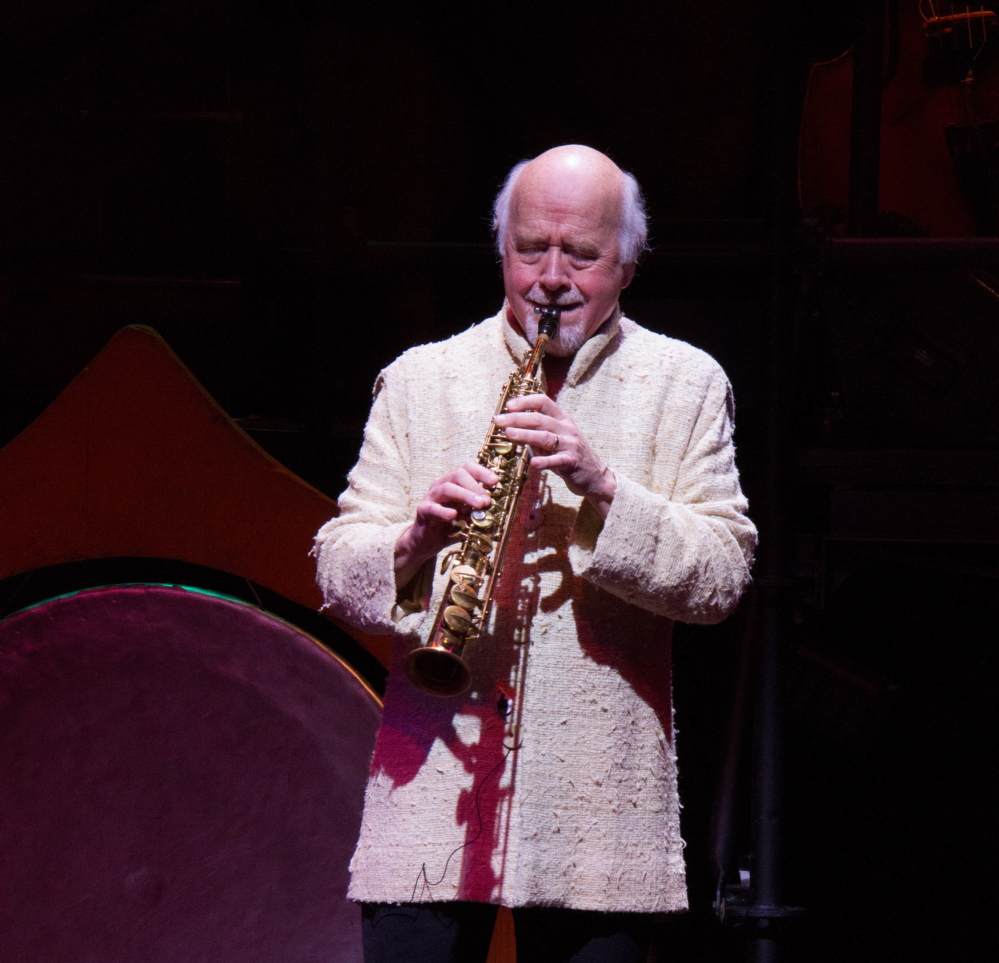Can there be democracy in music? Paul Winter, whose CDs have won seven Grammy awards (so far) thinks so, and after a weekend class with him at Rowe Conference Center in the Berkshires of western Massachusetts, I tend to agree.
My art teacher used to say that anyone who can sign his name can draw. Winter demonstrated that anyone who can hold a conversation can produce music, alone or in an ensemble. All you need to do is listen.
Among 20 attendees were one professional musician, an actress, an anesthesiologist, a librarian, a builder, a maker of native American flutes and drums, a musical instrument collector and a former clown, who now plays the musical saw as well as the violin.
The instruments available included a Theremin, the above-mentioned musical saw, native American flutes, singing bowls, gongs, an electric lap guitar, and didgeridoos. Among them, too, was a waterphone, an instrument invented by the late Richard Waters that consists of brass rods welded to a stainless steel vessel containing water. When the rods are bowed or struck they produce unusual sounds that can be “bent” by moving the water inside.
There were also two communal instruments called amadindas, like giant xylophones made of 12 two-by-fours or two-by-sixs of various lengths, tuned to a pentatonic scale, and played by three or more people.
Winter began with group singing exercises, then called for five quartets of various instruments. The combinations were random and each group improvised for 10 seconds, then for 20, so that each could hear what the others sounded like. Although Winter would reject the word “better,” the sound of each continued to improve remarkably as the sequence went round and round. The experiment was carried out in total darkness.
Then it was time for the full orchestra. The results, on the first day and for the rest of the conference, were remarkable. At first, it sounded like a bad tune-up, until everyone got a feel for his or her place. Then strange things began to happen. Someone would venture a phrase, someone else would reply, then others would fill in what they perceived as gaps in the harmony, counterpoint and rhythm. Anything that seemed to its owner to be out of place disappeared. When something did fit, it clicked immediately, like the right piece in a jigsaw puzzle.
Since there was no right or wrong, there were no wrong notes. With that freedom came amazing creativity. Merely by listening intently, each person became a composer, and a pretty good one. The resultant work contained some brilliant and unusual harmonies, melody, a beginning, middle, development and mutually agreed-upon end, all without speaking, visual cues or leadership of any kind.
Rhythm, unless a special effort was made, tended to resolve into 4/4 time, but Winter pointed out that in Africa it might have come down to 12/8 time, or in the Balkans, 7/8 – ” whatever you grew up with.”
There were plenty of other exercises in rhythm and communal playing – the combination of didgeridoos and amadindas was particularly striking – but the result of free improvisation by a group, of instruments or voices, was by far the most memorable.
Winter, a gentle, quiet presence, is not enthusiastic about virtuosi, leaders, sitting in class or the hierarchical system in general. He is the direct opposite of Stravinsky, a poor conductor, who insisted that musicians adhere to the letter of the score. One of Winter’s mild criticisms of a piece of music is that it sounds “written out.”
That was definitely not true of a horror-movie music improvisation performed on Theremin, musical saw, electric lap guitar and gongs. “Eerie” does not do it justice.
Without accepting the democracy thesis in its entirety – Winter is also a popular interpreter of Bach – the weekend was a refreshing change for anyone brought up on traditional interpretation and rigid adherence to the score. It also called into question the role of the conductor.
It will be interesting next spring to hear the 90th anniversary gala of the Portland Symphony Orchestra, in which music director Robert Moody and three of his predecessors will conduct four classic and modern works. Will one be able to tell the difference blindfolded?
As for virtuosi, when Winter played a gorgeous improvised solo on soprano saxophone, as a farewell to his students, he demonstrated that he is one, in spades. He had said earlier that virtuosity was okay, as long as the showing off didn’t last too long.
Christopher Hyde is a writer and musician who lives in Pownal. He can be reached at: classbeat@netscape.net
Send questions/comments to the editors.



Success. Please wait for the page to reload. If the page does not reload within 5 seconds, please refresh the page.
Enter your email and password to access comments.
Hi, to comment on stories you must . This profile is in addition to your subscription and website login.
Already have a commenting profile? .
Invalid username/password.
Please check your email to confirm and complete your registration.
Only subscribers are eligible to post comments. Please subscribe or login first for digital access. Here’s why.
Use the form below to reset your password. When you've submitted your account email, we will send an email with a reset code.